Skyrim is one of the biggest names of this console generation. It's already earned the status of "classic" in some circles. It's over three years old now, and I've been playing it (and its DLC) on my PS3 off and on for much of that time. I've been wanting to write a review, but I just never felt that I had progressed far enough into the game to have a full idea of its overall quality. Considering how long the game's been out, and how successful it's been both critically and commercially, this is more of a retrospective than a true review, since I'm not going to influence anybody's purchase decision. All I can do at this point is talk about what I think he game did right, and what it did wrong, so that future games can hopefully improve on the formula.
After years of playing, I've finally made enough progress with various characters to feel comfortable writing a review. With the recent rumors that Fallout 4 may reuse Skyrim's engine, I feel that this review actually has some relevance still.
The game also includes DLC, which I have reviewed separately in a another post.
The engine finally works! … Mostly …
It seems like Bethesda’s open-world game engine is finally maturing. It’s still a little rough around the edges and has its fair share of bugs and glitches (particularly pertaining to companion characters and home customization), but I was amazed when I realized that, for the first time with a Bethesda RPG, I had been playing the game for weeks without needing to consult the online wiki to find a work-around for a glitch that rendered any characters missing, quests inaccessible, or items missing! With Oblivion and the two Fallout games, it didn’t take more than a few hours of gameplay to start running into such glitches.
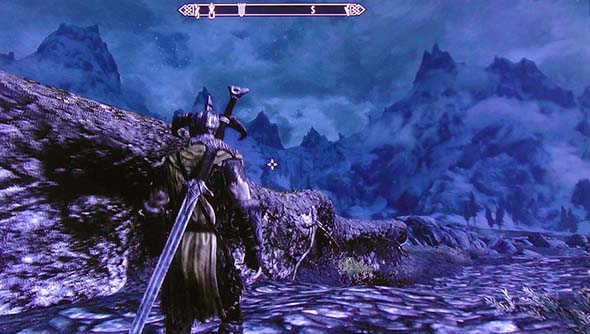
The large, open world is finally stable enough to be more fun than frustrating.
My roommate actually had a game-breaking glitch that prevented him from saving after the initial character creation (including auto-saves), so he lost a whole Saturday afternoon’s worth of progress and had to restart the game. That one was a doozy, and admittedly the worst bug that I've experienced so far in any Bethesda game! But these problems have been the exception rather than the norm.
So that’s one big check mark in Skyrim’s favor compared to previous Bethesda games!
Removing level-scaling makes leveling a reward rather than a punishment
Believe it or not, it wasn't the frequency of glitches that deterred me from finishing Oblivion; it was the level-scaling system. On paper it seemed like a good idea. Leveling up the enemies, quests, and loot so that the game is consistently challenging and rewards are consistently worthwhile sure sounded like a good idea!
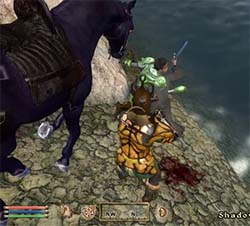
Oblivion's level-scaling resulted in a world overrun by trolls, glass-armored bandits, and Daedra.
But in practice, it turned out to be completely ruinous. Leveling felt more like a punishment than a reward, as everything in the world also became progressively harder. This issue was compounded by the poor balance between different classes. If you weren't leveling your combat skills, and had created a class built around - say - Mercantile, Athletics, and Acrobatics then you could easily over-level early in the game simply by walking around and talking to NPCs, only to get slaughtered in the first Oblivion gate because the enemies were stronger than you and you couldn't talk your way out of the fight.
Skyrim fortunately, does not retain Oblivion's strict level-scaling feature.
Some quests, enemies, and loot are scaled, but most things are not (or they're only slightly scaled). Now, bandits are always just bandits, overpowering enemies start the game overpowered, and the world does not suddenly become exclusively populated by trolls and Daedra halfway through the game. "Dungeon bosses" do seem to scale with the character’s level. As you start going up in levels, you’ll start to notice that the grunts in the dungeons are trivial to fight and leave worthless loot. You’ll actually feel like all that leveling has paid off! Then you get to the "boss" at the end of the dungeon and might get your ass handed to you and have to reload several times.
Hard areas should be hard, and easy areas should be easy. It's just mildly annoying that this game gives you no indication which it’s going to be until you’re already a mile underground, and the difficulty varies wildly - even within a single dungeon crawl.
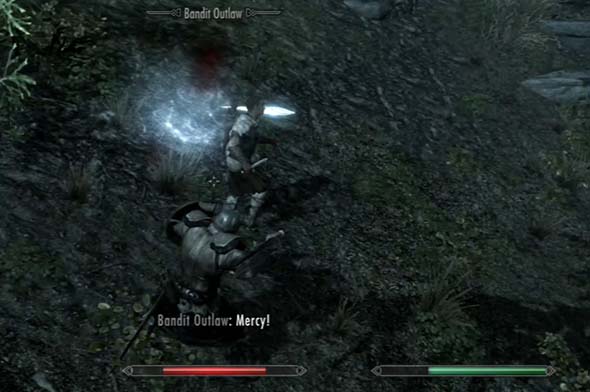
Most ambient encounters aren't scaled to the player's level, so bandits always remain just bandits.
Removing the class skills frees up the player to develop whatever skills he or she needs without the compulsion to micro-manage leveling class skills versus non-class skills. Character development feels much more natural and organic, and you can change your specialization at any time if circumstances change ... [More]
452deb1e-0838-4ffe-a6da-528d57ba6804|3|2.0
Tags:The Elder Scrolls, The Elder Scrolls V: Skyrim, Skyrim, Bethesda, RPG, action, fantasy, open world, dragon, dragonborn, magic, user interface, NPC, AI
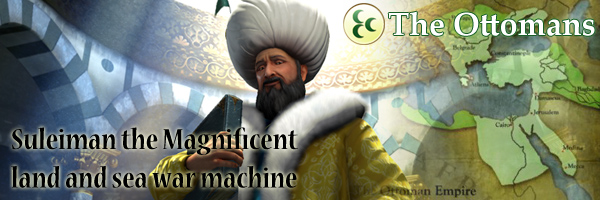
I've already covered strategies for the civilizations that have been added or explicitly changed in the Brave New World expansion and its major fall (2013) patch. Now I'm going to move on to other legacy civilizations that have not had explicit changes, but who may have had their strategies significantly altered by the expansions and other updates. The first such civilization that I am going to tackle is one that has been requested from readers on at least several occasions. So, by popular request, here is a strategy for Sultan Suleiman's Ottoman Empire.
The rise of the Ottoman empire coincided with the fall of the Byzantine empire that started in the late thirteenth century. Turkish immigrants lead by Osman I took control of a region of Anatolia and Osman declared himself the first Sultan of a new Islamic empire. The fledgling empire quickly began a cycle of conflicts with the Byzantine empire that culminated in the capture of Constantinople, which the Ottomans renamed Istanbul and made their imperial capital. With control of the valuable ports of Istanbul that linked the Mediterranean with the Black Sea, the Ottoman empire rapidly became a dominant force in the Middle East and Europe.

Sultan Suleiman The Magnificent ruled the Ottoman empire during the height of its power in the sixteenth century. His fleets dominated the seas of the Mediterranean - and extended its influence all the way to India and Indonesia - thanks in part to the successes of Hayreddin Barbarossa, who captured numerous ships on his way to becoming the Ottoman fleet admiral. In addition to military successes, Suleiman also personally initiated a series of sweeping social and legal reforms that contributed to the flourishing of the Ottoman arts and economy.
The Ottoman Empire would eventually become one of the most significant casualties of World War I. The empire was already starting to succumb to the stresses of internal strife and a weakening economy. Their defeat in World War I basically dissolved the Ottoman empire, and what was left of its holdings became the modern nation of Turkey. [More]
e1b70122-9c10-4a58-b569-98239be273c5|5|3.6
Tags:Sid Meier's Civilization, Civilization V: Brave New World, Civilization V, Ottoman, Suleiman, Istanbul, Janissary, Sipahi, Barbary Corsairs, barbados, navy, exploration, reconnaissance, musketman, lancer, Landsknecht, Prize Ships, unit cap, unit maintenance, Civ V Fall Patch, Civ-V
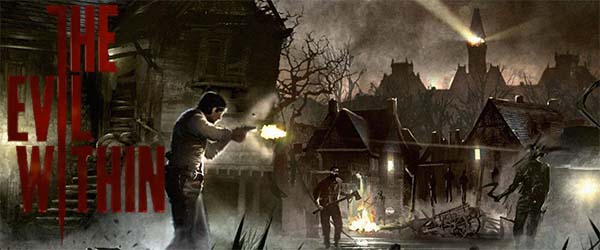
I had some really high hopes for The Evil Within. It looked like Shinji Mikami was trying to bridge a gap between the survival horror trappings of the original Resident Evil and the more action-oriented shooter gameplay style of Resident Evil 4. The former was a slower-paced game that emphasized open-ended exploration, puzzle-solving, and resource management in a horror setting. The latter game dropped most of its horror ambitions in favor of totally campy action shooter schlock. Early trailers for Evil Within looked it would hit a good balance between the two styles.
I didn't jump right on this game at release because I saw some mediocre reviews and heard that it failed to deliver on its promises. After booting up the game, waiting for an hour-and-a-half for the 4.7 GB update file to install (what did this update do? Tack on a whole new game?!), navigating the slick title menu, and then proceeding through the first few chapters, I verified that the game does indeed fail considerably as a horror game.
But it is worth noting that The Evil Within (unlike Resident Evil 4 and Shadows of the Damned) does seem to be making a legitimate attempt at being a horror game, rather than just an action shooter with zombies. It just doesn't really succeed at this goal.
Early levels in particular are full of exceptional lighting and ambient effects that really help to build an ominous atmosphere. The addition of stealth mechanics does put a greater emphasis on avoiding direct conflict and encouraging a more cautious approach (compared to RE4's guns-a-blazing attitude).
I've heard a lot of complaints that this game's story doesn't make sense and is stupid. I think most of these people didn't finish the game (or at least get to the point around chapter 10 where the story is explained). The story makes sense. The problem is that the game is very disjoint and never really builds on these foundations.
The game's narrative causes the character to jump (seemingly at random) from place to place - even within a single chapter. Each new place quickly starts to feel like a narrow-scope set-piece for an action scene rather than any kind of terrifying world. The game and individual chapters lack narrative cohesion and unifying design. There's very little opportunity for the game to allow open exploration or atmosphere-building, since the whole game feels like a collection of randomly-thrown-together set pieces and battle puzzles. So even though the overall story makes sense (in retrospect), the individual scene and level-progression doesn't.
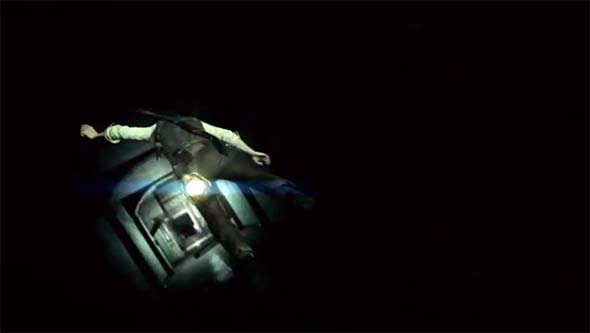
Reality is being warped, resulting in some trippy effects, but a very disjoint sense of progression.
The designers seem to be trying to mimic the Otherworld of Silent Hill, but the transition is so jarring, and the places feel so completely unrelated to one another, that it just doesn't work. You get through a pain in the ass, trap-infested maze while dodging monsters, only to be teleported to another maze area when you reach the exit! "OK, we're done with this area, let's just go to some other random challenge room." There's no sense of ever achieving anything because you're rarely ever allowed to actually go to the places that you are trying so hard to get to. And once that sense of futility sets in, any fear starts to dissipate. You're no longer concerned with getting out or saving yourself or even progressing the story because you realize that you can't achieve anything without the game giving it to you.
It's a real shame too, because some of these reality-warping mind tricks might be very effective if they were organically integrated into the flow of the game. I especially liked one bit in which a character falls down a bottomless pit, only to have the whole world re-orient itself so that the walls become the floor. So instead of falling to his death, he harmlessly rolls to a stop. Unfortunately, these effects lack subtly and feel random... [More]
ce16d91f-e2af-4e72-9f81-822136d27e6a|2|3.5
Tags:The Evil Within, Bethesda, Tango Gameworks, survival horror, action, shooter, stealth, Sebastian Castellanos, zombies, mental institution, Shinji Mikami, Resident Evil 4
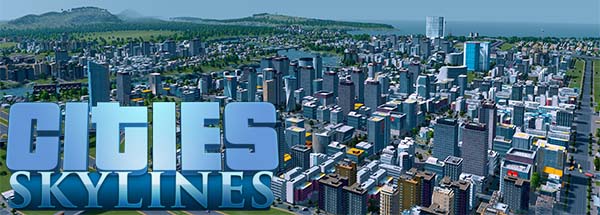
I've been on quite a city-builder bender this past eight months or so, and I've gone through quite a variety of games! From Tropico 5, to Cities XXL, Banished, and even a foray into the mobile game SimCity Buildit. Since the SimCity reboot in 2013 turned out to be a bust, I've been desperately searching for a modern game to fill the hole that was left after I moved on from SimCity 4. Cities XL held me over for a while, but my interest in it waned, and I was back to searching.
Well now that search can finally end, because I think I found my new, definitive city-builder: Cities: Skylines!
Almost immediately after starting a game, Skylines stands out as a very pretty game. The graphics have a very slight, cartoonish quality with very bright, vibrant colors. The animations are very smooth and fluid, which makes the map look very organic and alive. There's also some film grain and depth of field filters that can provide an immersive sense of being in the city when you zoom in. The depth of field effect only focuses on the center of the screen, which can look weird when you zoom very far in to look at certain objects. But if these effects become too bothersome, then you can always turn them off, and the game still looks great without them.
The various overlays are also very vibrant and have their own animations that show the flow of traffic along roads or water through pipes, and these overlays are also very pretty. The color contrasts also make them very easy to read and understand at a glance.
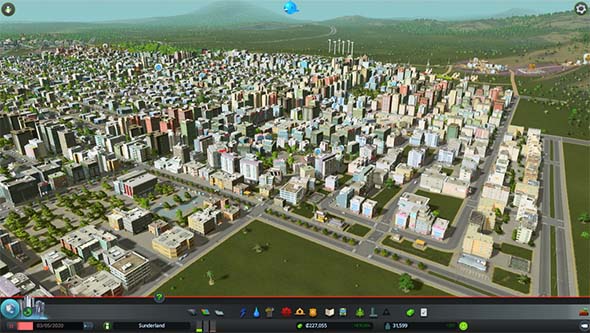
This game has very vibrant and attractive graphics and art styles that make the city look alive.
The game also has a very simple interface that looks good and is easy to read. Navigating through the menus is comfortable and intuitive, and it doesn't take up very much screen space.
Much like Cities XL, Skylines also gradually unlocks new buildings, infrastructure, and services as the city grows. Again, as somebody who routinely ran my SimCity 2000 cities into bankruptcy by overbuilding services and utility infrastructures early, I appreciate how this feature creates a gentler learning curve and helps to tutorialize new players in how the new features work.
Skylines differentiates itself from Cities XL and SimCity by providing a much more comfortable compromise of pacing and scale... [More]
b004b9b6-ce66-4953-8dd0-cc1289e3a97a|2|5.0
Tags:Cities: Skylines, Colossal Order Ltd., Paradox Interactive, Steam, Steam Workshop, city simulation, resources, roads, traffic, utilities, water pipes, power lines, garbage collection, cemetery, asset editor, policies
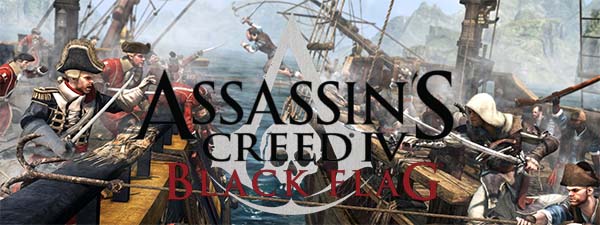
It occurs to me that there is a sad dearth of pirate and sailing games in the market. The original Sid Meier's Pirates! is almost 30 years old! And the PC remake was released all the way back in 2004. Other than that, the only pirate or sailing-themed video games that I'm aware of are mobile games.
We saw a proliferation of cowboy and western-themed games after Rockstar's Red Dead Redemption (which, in hindsight, probably isn't as good as I gave it credit for). Perhaps Assassin's Creed IV: Black Flag could trigger a similar renaissance for pirate video games. And if those games are as good as Black Flag (or better), then that would be a real treat!
Hrm, this mission seems familiar...
[LEFT] A plantation raid in Assassin's Creed III; [RIGHT] another plantation raid in Black Flag.
The first hour or two after Black Flag's introductory pirate ship battle is a bit dull because it's mostly just the same old stuff that you've played in Assassin's Creed III: exploring the little town and playing a few "go here, do this" missions with an assassination or two.
Being stuck on land is usually pretty dull. In fact, some missions even seem copy-pasted from previous games. When I got to the mission in which I had to raid a sugar plantation, I couldn't help but think "Hey, didn't I already do this in III?" The only notable difference was that that the plantation raid was wrapped in a segment in which I had to pursue the plantation-owner's ship from a trade island to his plantation island.
Over the course of the game, you'll frequently be forced to step back onto land for story missions. some of the environments are a bit original, since there's some trekking through jungles and along beaches and scaling cliffs to break up the monotony of the usual parkour that the series is known for. Most of these jungle paths are closed and linear, so you won't be exploring open jungle with a machete.
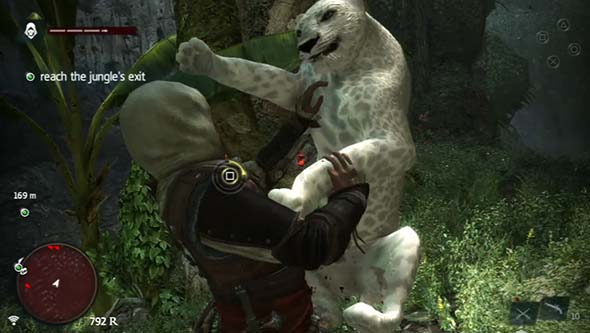
The jungle and beach settings provide some visual variety beyond the city parkour, but are functionally similar.
There aren't any dramatic new gameplay functionalities associated with the more rural and wild settings beyond the tree-hopping that was featured in Assassin's Creed III. So while these missions provide some visual variety, they don't add much to the actual gameplay. The biggest change is that it takes a lot of your freedom of movement away, since you have to follow more of the pre-designed trails through the levels, rather than having the freedom to create your own route.
...
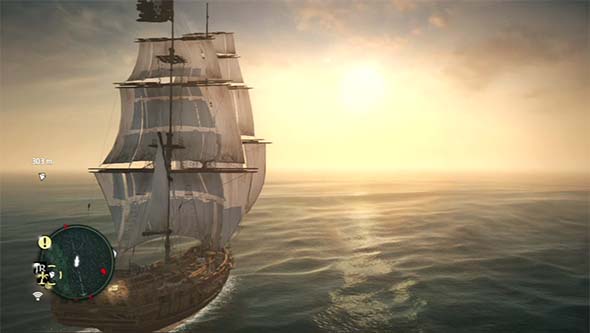
Black Flag sails triumphantly into the sunset as a stand-out game in an oversaturated franchise.
[More]
7e892d39-9984-470d-9a5a-364999153dc1|0|.0
Tags:Assassin's Creed, Assassin's Creed IV: Black Flag, Ubisoft, Caribbean, Cuba, Havana, assassin, parkour, pirates, swashbuckling, sailing, naval combat, privateer, history, historical fiction, Black Beard, Britain, Spain
|

| 12 | | | | | | | 60 | | 11 | | | | | | | 55 | | 10 | | | | | | | 50 | | 09 | | | | | | | 45 | | 08 | | | | | | | 40 | | 07 | | | | | | | 35 | | 06 | | | | | | | 30 | | 05 | | | | | | | 25 | | 04 | | | | | | | 20 | | 03 | | | | | | | 15 | | 02 | | | | | | | 10 | | 01 | | | | | | | 05 |
|